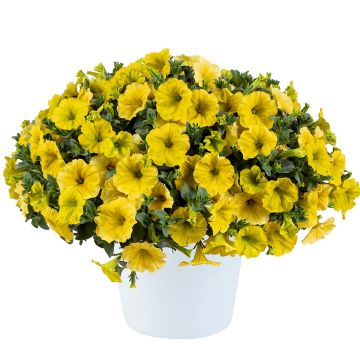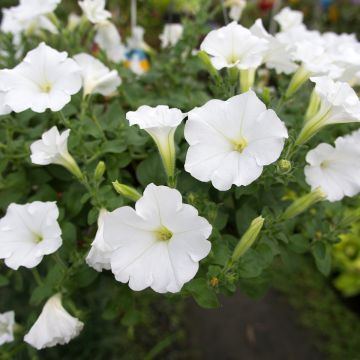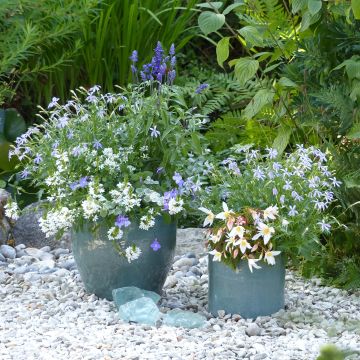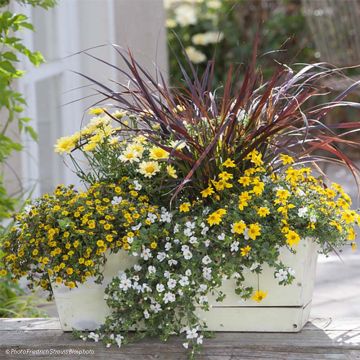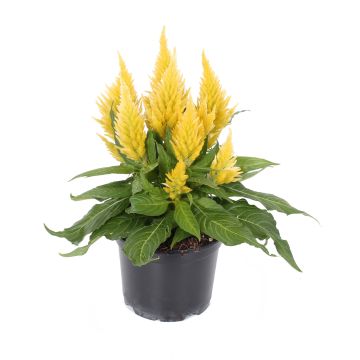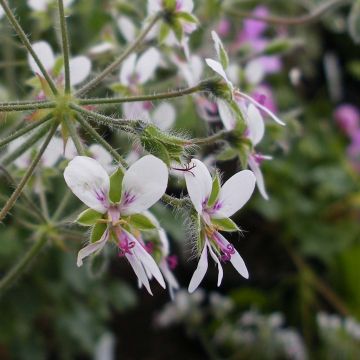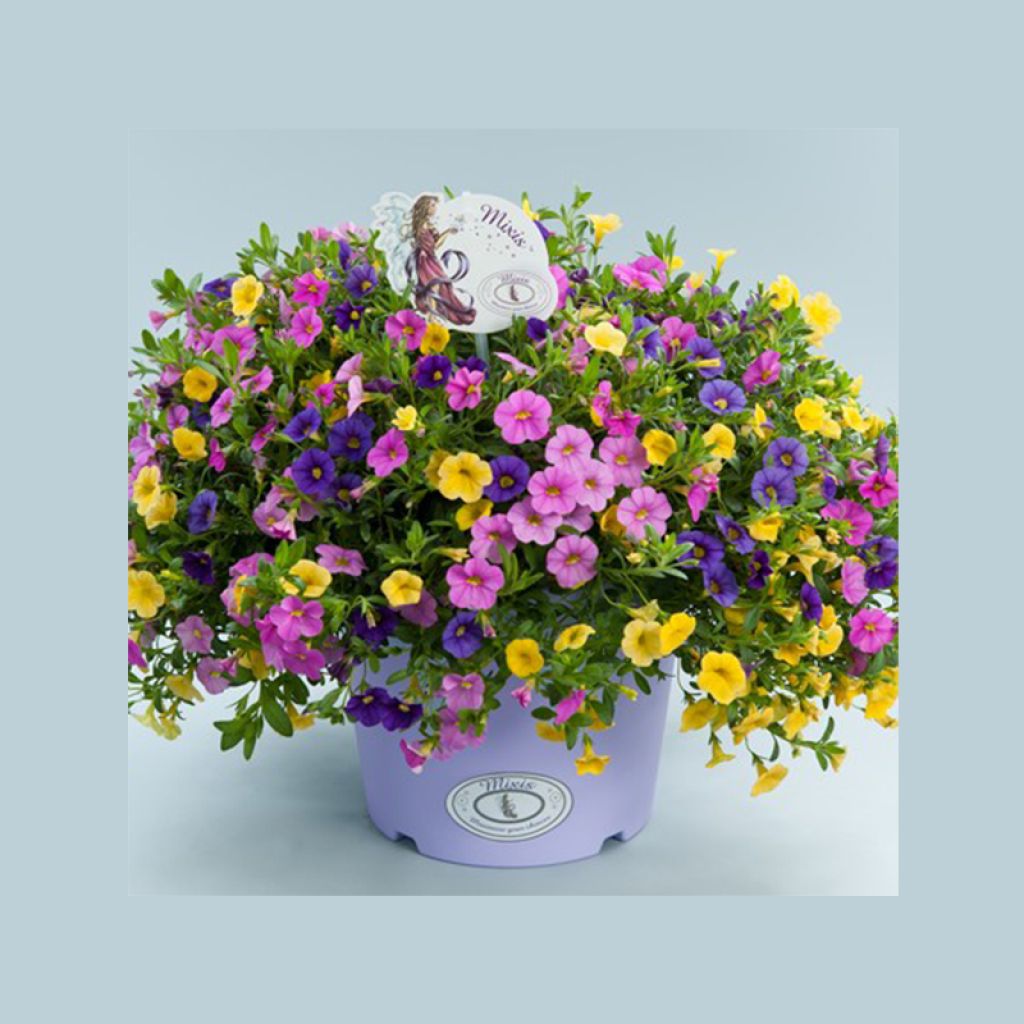

Calibrachoa Mixis Cymbeline - Trio de mini-pétunias bleu, jaune, rose.
Calibrachoa Noa Mixis Cymbeline - Trailing Petunia
Calibrachoa hybrida Noa Mixis Cymbeline
Million Bells, Trailing Petunia
Disappointed because I thought I would receive 3 different colours, instead I have 3 identical shades of pink. RESPONSE FROM PROMESSE DE FLEURS We are truly sorry as we place great importance on the quality of our plants and their growth. If you have any questions or concerns, please do not hesitate to contact us at 03.61.76.08.10.
CHENDA NEANG, 04/05/2016
Why not try an alternative variety in stock?
View all →This plant carries a 6 months recovery warranty
More information
We guarantee the quality of our plants for a full growing cycle, and will replace at our expense any plant that fails to recover under normal climatic and planting conditions.
From €5.90 for pickup delivery and €6.90 for home delivery
Express home delivery from €8.90.
Does this plant fit my garden?
Set up your Plantfit profile →
Description
The Calibrachoa 'Mixis Cymbeline' selection brings together three varieties from the Noa series in a large bouquet of flowers with intense freshness. The bushy plants produce countless small funnel-shaped flowers, yellow, soft pink and fresh or even deep blue. This fantastic annual forms pretty dense and spreading clumps that joyfully overflow from flower pots, offering a sensational display from spring to the first frost. Low water requirements, resistant to rain and almost maintenance-free, this collection of annuals is essential in hanging baskets or sunny borders. Provide it with a fertile, neutral to acidic and well-drained soil.
Calibrachoa, sometimes called Million Bells, are tender perennial plants often grown as annuals. Very similar to petunias, they differ in the number of chromosomes that make up their genetic heritage and some morphological characteristics; their flowers are smaller, their growth habit is shrubby or herbaceous with woody stems, their development is less significant and they tolerate drought better. The hybrids that make up this group all belong to the Solanaceae family (like tomatoes) and are probably descended from an Argentine species called Petunia integrifolia. The improved 'Noa' series stands out for its early and long-lasting flowering, good resistance to bad weather and low maintenance.
The plants in the 'Mixis Cymbeline' selection belong to the 'Noa Yellow', 'Noa Mega Pink' and 'Noa Blue Legend' varieties. They quickly form clumps that are wider than they are tall, 20 to 25 cm (8 to 10in) in height and 30 to 40 cm (12 to 16in) in diameter. Their flexible stems are covered throughout their length with small lanceolate, evergreen, velvety and slightly sticky leaves, of a dark green colour that admirably enhances the flowering of this trio. This tireless flowering takes place from May until the frosts. Numerous small trumpet-shaped flowers bloom at the axils of the leaves; they are 3 to 4 cm (1 to 2in) wide and cover the faded flowers that eliminate themselves. From June to August, the dominant colour of the composition varies, with a predominance of pink flowers at the end of the season. The 'Yellow' variety also proves to be very vigorous and very floriferous at the beginning of the flowering period.
The Calibrachoa 'Mixis Cymbeline' is ideal in hanging baskets, flower pots or containers, but its heat resistance, drought tolerance and excellent flower durability in the rain also allow it to be used in the ground, where it forms vibrant borders in sunny flower beds. It can be planted alone in troughs, flower pots, balcony planters on the terrace, balcony or patio. An association with Verbena, Surfinia petunias, bacopas and nemesias is remarkable. The choice is vast and allows for imagination and the tastes of every gardener, even inexperienced ones.
Note: Attention, our plug plants are professional products reserved for experienced gardeners: upon receipt, transplant and store them under shelter (veranda, greenhouse, cold frame) at a temperature above 14°C (57.2°F) for a few weeks before being installed outdoors once the risk of frost is definitively eliminated.
Report an error about the product description
Flowering
Foliage
Plant habit
Botanical data
Calibrachoa
hybrida
Noa Mixis Cymbeline
Solanaceae
Million Bells, Trailing Petunia
Cultivar or hybrid
Other Calibrachoa or Mini-petunia
Planting and care
You can plant your 'Noa' Calibrachoas in the ground or in a pot. If you want to plant them in the ground, in soil enriched with compost, wait until the last heavy frosts have passed. In the meantime, you can pre-cultivate them in a pot in a warm and bright place to accelerate their growth. The 'Noa' Calibrachoas will flower from May-June to October. Plant them in a sunny position sheltered from the wind. They need a light and humus-rich, lime-free soil, but above all, it needs to be well-draining, and they are sensitive to stagnant water. Do not water them too much at the beginning of the growing season as they are sensitive to excess humidity. They tolerate drought well, but will need regular watering during hot summer periods. Very floriferous and fast-growing, they are hungry plants. We recommend feeding them with a liquid fertilizer for surfinias once or twice a week during the growing season. Although not obligatory, you can remove faded flowers and dry leaves regularly to keep them looking beautiful and extend the flowering period.
Planting period
Intended location
Care
-
, onOrder confirmed
Reply from on Promesse de fleurs
Plug plants - Annuals
Haven't found what you were looking for?
Hardiness is the lowest winter temperature a plant can endure without suffering serious damage or even dying. However, hardiness is affected by location (a sheltered area, such as a patio), protection (winter cover) and soil type (hardiness is improved by well-drained soil).

Photo Sharing Terms & Conditions
In order to encourage gardeners to interact and share their experiences, Promesse de fleurs offers various media enabling content to be uploaded onto its Site - in particular via the ‘Photo sharing’ module.
The User agrees to refrain from:
- Posting any content that is illegal, prejudicial, insulting, racist, inciteful to hatred, revisionist, contrary to public decency, that infringes on privacy or on the privacy rights of third parties, in particular the publicity rights of persons and goods, intellectual property rights, or the right to privacy.
- Submitting content on behalf of a third party;
- Impersonate the identity of a third party and/or publish any personal information about a third party;
In general, the User undertakes to refrain from any unethical behaviour.
All Content (in particular text, comments, files, images, photos, videos, creative works, etc.), which may be subject to property or intellectual property rights, image or other private rights, shall remain the property of the User, subject to the limited rights granted by the terms of the licence granted by Promesse de fleurs as stated below. Users are at liberty to publish or not to publish such Content on the Site, notably via the ‘Photo Sharing’ facility, and accept that this Content shall be made public and freely accessible, notably on the Internet.
Users further acknowledge, undertake to have ,and guarantee that they hold all necessary rights and permissions to publish such material on the Site, in particular with regard to the legislation in force pertaining to any privacy, property, intellectual property, image, or contractual rights, or rights of any other nature. By publishing such Content on the Site, Users acknowledge accepting full liability as publishers of the Content within the meaning of the law, and grant Promesse de fleurs, free of charge, an inclusive, worldwide licence for the said Content for the entire duration of its publication, including all reproduction, representation, up/downloading, displaying, performing, transmission, and storage rights.
Users also grant permission for their name to be linked to the Content and accept that this link may not always be made available.
By engaging in posting material, Users consent to their Content becoming automatically accessible on the Internet, in particular on other sites and/or blogs and/or web pages of the Promesse de fleurs site, including in particular social pages and the Promesse de fleurs catalogue.
Users may secure the removal of entrusted content free of charge by issuing a simple request via our contact form.
The flowering period indicated on our website applies to countries and regions located in USDA zone 8 (France, the United Kingdom, Ireland, the Netherlands, etc.)
It will vary according to where you live:
- In zones 9 to 10 (Italy, Spain, Greece, etc.), flowering will occur about 2 to 4 weeks earlier.
- In zones 6 to 7 (Germany, Poland, Slovenia, and lower mountainous regions), flowering will be delayed by 2 to 3 weeks.
- In zone 5 (Central Europe, Scandinavia), blooming will be delayed by 3 to 5 weeks.
In temperate climates, pruning of spring-flowering shrubs (forsythia, spireas, etc.) should be done just after flowering.
Pruning of summer-flowering shrubs (Indian Lilac, Perovskia, etc.) can be done in winter or spring.
In cold regions as well as with frost-sensitive plants, avoid pruning too early when severe frosts may still occur.
The planting period indicated on our website applies to countries and regions located in USDA zone 8 (France, United Kingdom, Ireland, Netherlands).
It will vary according to where you live:
- In Mediterranean zones (Marseille, Madrid, Milan, etc.), autumn and winter are the best planting periods.
- In continental zones (Strasbourg, Munich, Vienna, etc.), delay planting by 2 to 3 weeks in spring and bring it forward by 2 to 4 weeks in autumn.
- In mountainous regions (the Alps, Pyrenees, Carpathians, etc.), it is best to plant in late spring (May-June) or late summer (August-September).
The harvesting period indicated on our website applies to countries and regions in USDA zone 8 (France, England, Ireland, the Netherlands).
In colder areas (Scandinavia, Poland, Austria...) fruit and vegetable harvests are likely to be delayed by 3-4 weeks.
In warmer areas (Italy, Spain, Greece, etc.), harvesting will probably take place earlier, depending on weather conditions.
The sowing periods indicated on our website apply to countries and regions within USDA Zone 8 (France, UK, Ireland, Netherlands).
In colder areas (Scandinavia, Poland, Austria...), delay any outdoor sowing by 3-4 weeks, or sow under glass.
In warmer climes (Italy, Spain, Greece, etc.), bring outdoor sowing forward by a few weeks.





































